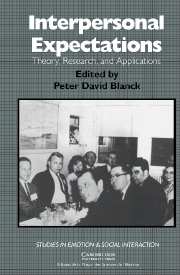Book contents
- Frontmatter
- Contents
- Preface
- List of contributors
- Introduction
- Part I Research on interpersonal expectations
- 3 Introduction to research on interpersonal expectations
- 4 Interpersonal expectations in the courtroom: Studying judges' and juries' behavior
- 5 Expectancies and the perpetuation of racial inequity
- 6 Pygmalion - 25 years after interpersonal expectations in the classroom
- 7 Interpersonal expectations in organizations
- 8 Interpersonal expectations and the maintenance of health
- 9 Precursors of interpersonal expectations: The vocal and physical attractiveness stereotypes
- 10 In search of a social fact: A commentary on the study of interpersonal expectations
- Part II Research on the mediation of interpersonal expectations through nonverbal behavior
- Part III The study of interpersonal expectations
- Author index
- Subject index
- Studies in Emotion and Social Interaction
3 - Introduction to research on interpersonal expectations
from Part I - Research on interpersonal expectations
Published online by Cambridge University Press: 23 December 2009
- Frontmatter
- Contents
- Preface
- List of contributors
- Introduction
- Part I Research on interpersonal expectations
- 3 Introduction to research on interpersonal expectations
- 4 Interpersonal expectations in the courtroom: Studying judges' and juries' behavior
- 5 Expectancies and the perpetuation of racial inequity
- 6 Pygmalion - 25 years after interpersonal expectations in the classroom
- 7 Interpersonal expectations in organizations
- 8 Interpersonal expectations and the maintenance of health
- 9 Precursors of interpersonal expectations: The vocal and physical attractiveness stereotypes
- 10 In search of a social fact: A commentary on the study of interpersonal expectations
- Part II Research on the mediation of interpersonal expectations through nonverbal behavior
- Part III The study of interpersonal expectations
- Author index
- Subject index
- Studies in Emotion and Social Interaction
Summary
More than any other individual, Robert Rosenthal has put the concept of the self-fulfilling prophecy on the research agenda of the psychological community. Following his lead, other psychologists have moved the self-fulfilling prophecy from the psychological agenda to the national social policy agenda, drawing attention to the manifold implications that the existence of self-fulfilling prophecies has for interactional processes in legal, educational, organizational, and other social settings.
Putting an issue on such diverse agendas is no mean feat, and it is worth tracing how Rosenthal accomplished this. This answer is a sobering one; it required not only an incisive grasp of an important concept, but an incredibly large commitment of disciplined experimental energy over a period of years.
Nor can one argue that Rosenthal chose the maximally ingratiating and tactful way to introduce the construct of self-fulfilling prophecies to the psychological research community. In the 1960s, word swept the research community that an individual from the Dakotas, and then from Harvard, was demonstrating experimenter bias effects that fundamentally called into question the interpretations of the results of many experiments. We suspect that the general reaction of the research community was similar to the reactions of the corners of the community that the first author observed: initial resistance, later annoyed acceptance of the implications for the design of research, and still later the realization that an extremely general human phenomenon had been illuminated.
- Type
- Chapter
- Information
- Interpersonal ExpectationsTheory, Research and Applications, pp. 45 - 63Publisher: Cambridge University PressPrint publication year: 1993
- 4
- Cited by



